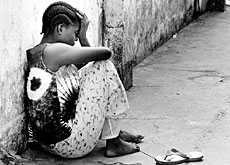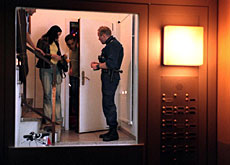Switzerland takes aim at people trade

The Swiss authorities want to step up the fight against human trafficking.
Up to two million people are estimated to be victims of the trade; between 1,500 and 3,000 of them are thought to be in Switzerland.
Worldwide, the business of trafficking has become extremely lucrative, worth an estimated $10 billion a year.
But getting exact facts and figures on this murky trade is very difficult, and that is one of the reasons Switzerland set up a nationwide coordination office at the start of this year.
The office, which is part of the Federal Police Office, brings together all the different authorities that deal with traffickers and their victims, from the border police, to immigration officials, to non-governmental organisations.
Prevent and punish
The aim of the office is to ensure that traffickers are brought to justice, and to try and prevent human trafficking happening in the first place.
“Human trafficking is modern-day slavery,” said Daniel Höchli, of the Swiss Federal Police. “It’s a worldwide problem, and Switzerland is affected too.”
Victims of human trafficking are typically young women from central and eastern Europe who are lured by promises of good jobs in wealthy western countries.
Once they arrive in their country of destination, their passports and money are taken from them, and they are often subjected to violent abuse before being forced into prostitution.
As part of the prevention campaign, the Swiss foreign ministry is also represented in the coordination office. It is keen to encourage Swiss embassies abroad to join the fight against trafficking.
“We have a very good project in Moscow. In our visa section we have publicity about trafficking, warning people to be careful,” Valerie Nadrai told swissinfo.
“And our staff know about the travel agencies which offer the victims ‘jobs’ in western Europe,” she continued. “If they see that a visa application has come from one of these agencies they do a double check.”
Legal loopholes
A big problem in fighting trafficking, however, is that the laws governing the crime contain several loopholes.
While trafficking itself carries a heavy penalty of up to 20 years under Swiss law, it only applies to trafficking with the aim of sexual exploitation.
Trafficking in order to sell human organs is not covered, and neither is trafficking in people who are forced to work in other ways.
Furthermore, simple smuggling of people is regarded more as a misdemeanour: an offence against Switzerland’s immigration laws. The maximum sentence is only three years, less than most other European countries.
Stephen Libiszewski, who is head of the coordination office, wants the Swiss government to close these loopholes.
“Smuggling and trafficking can become mixed up,” Libiszewski told swissinfo. “The problem lies in the fact that a person who is smuggled often has heavy debts to the smuggler, and this can then be used by the smuggler to exploit the person, to force a woman for example into prostitution in order to pay back the debts.”
The coordination office has asked the government to draft revisions to the law, raising the sentence for smuggling to five years, and including illegal organ trade and enforced labour in the trafficking law.
Porous borders
Switzerland’s border police are hoping for changes in the law too. They typically arrest over 30 people smugglers every month, but because they are short staffed, they often have to return them quickly to their countries of origin without interviewing them.
This means potentially valuable details on the mode of operation of the smugglers, and the routes they use, tend not to be discovered.
The police hope the exchange of ideas and information provided by the coordination office will help them gain a better picture of how the smugglers and traffickers work.
Poverty trap
But the root cause of human trafficking is poverty; while women in the world’s poorer countries still can’t feed and clothe their families, and while young men in the same countries face no job prospects whatsoever, the trade in humans, and in their organs, will continue.
The Swiss Agency for Development and Cooperation has introduced income generation projects in some of the worst affected countries, such as Moldova, where much of Europe’s trafficking is said to originate.
“Women in three villages are helped with expertise to get their projects off the ground,” explained Valerie Nadrai. “And they are helped with money, they get a micro credit.
“We hope that they can not only sustain themselves but also their families – kind of help a whole village.”
It’s an ambitious project, Nadrai admits, but with up to two million victims of trafficking worldwide, much more of this kind of generosity is needed.
swissinfo, Imogen Foulkes
The trade in humans is estimated to be worth $10 billion (US State Department figures 2001).
Human trafficking carries a maximum sentence of 20 years under Swiss law, people smuggling only three years. But the law on trafficking applies only to sexual exploitation.
Many victims are trafficked for the illegal trade in organs, or for other forms of forced labour.
The European Commission has directed EU member states to introduce sentences of eight years for people smuggling, Switzerland is considering raising the sentence to five.

In compliance with the JTI standards
More: SWI swissinfo.ch certified by the Journalism Trust Initiative


You can find an overview of ongoing debates with our journalists here. Please join us!
If you want to start a conversation about a topic raised in this article or want to report factual errors, email us at english@swissinfo.ch.